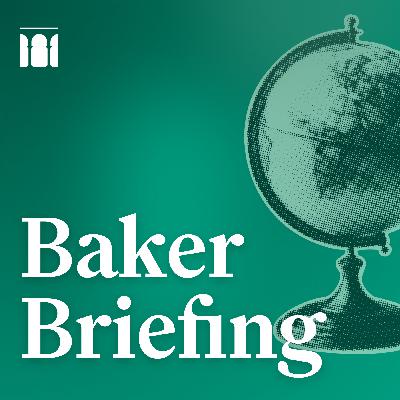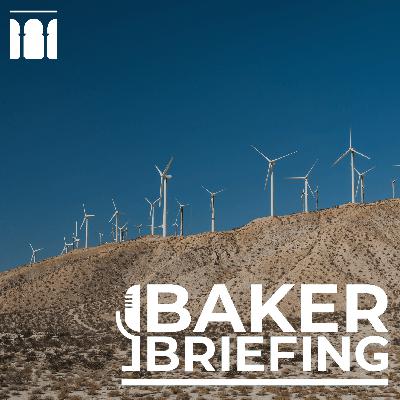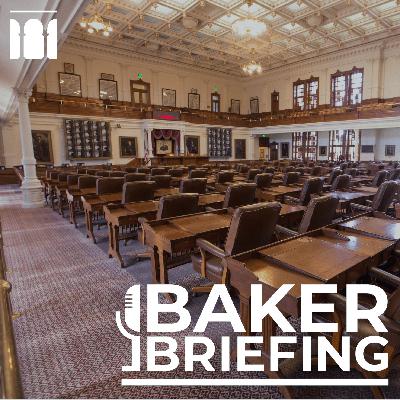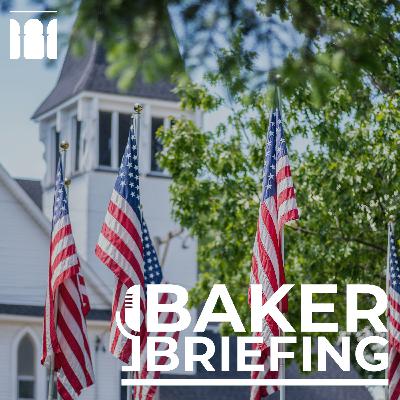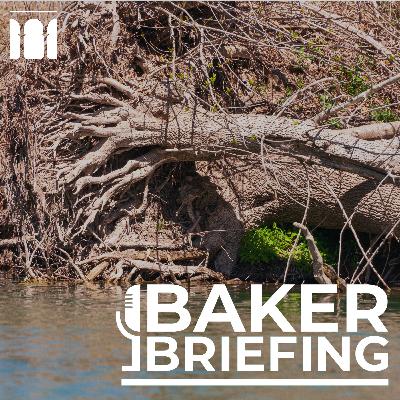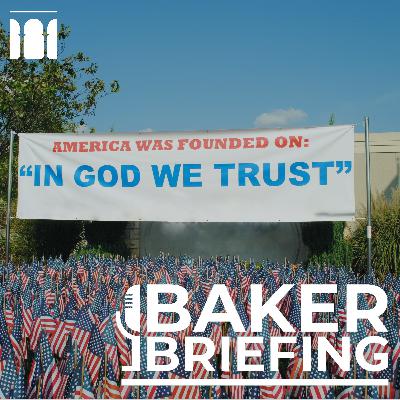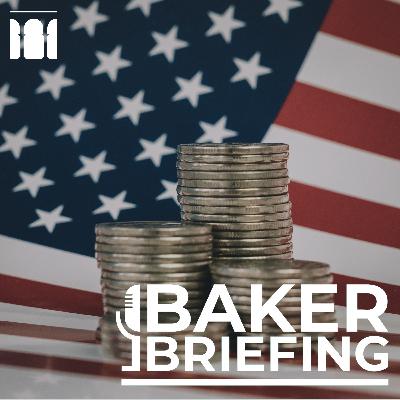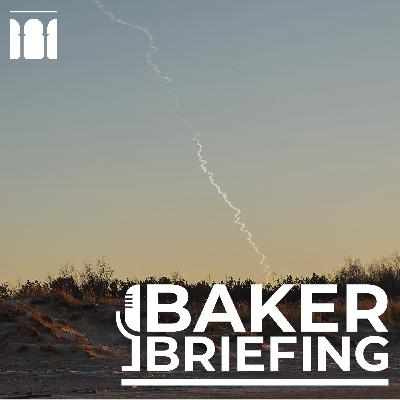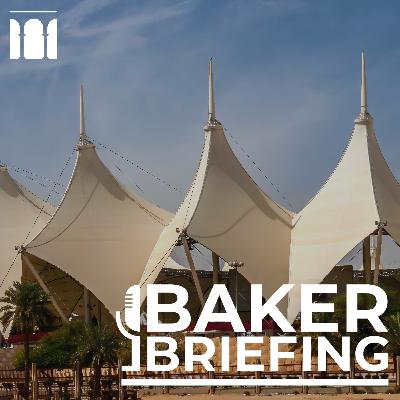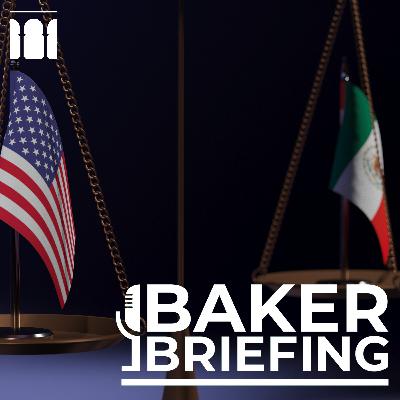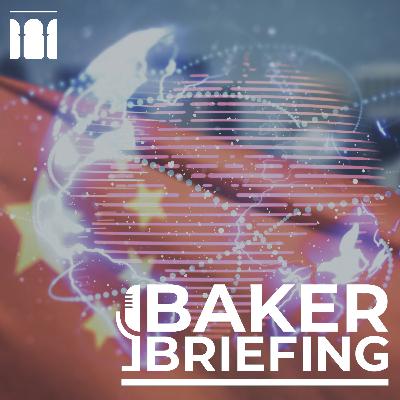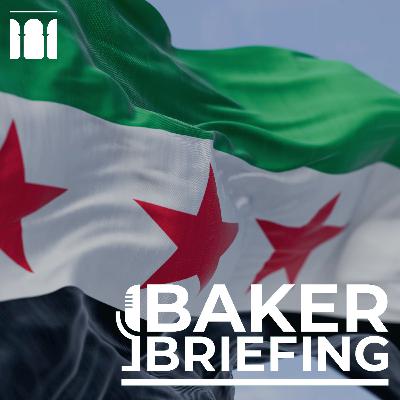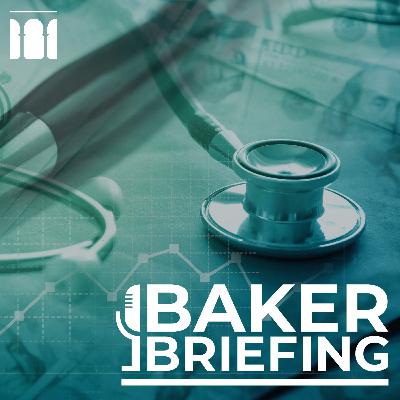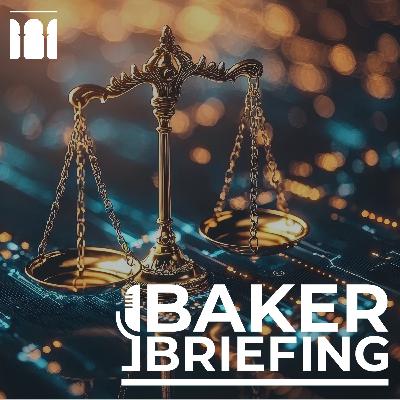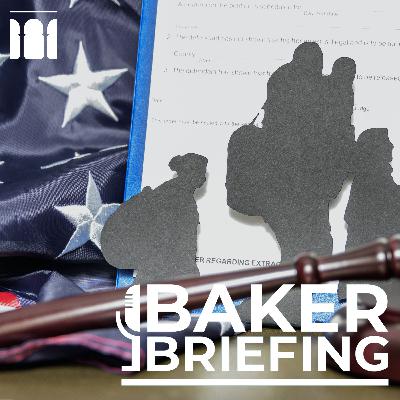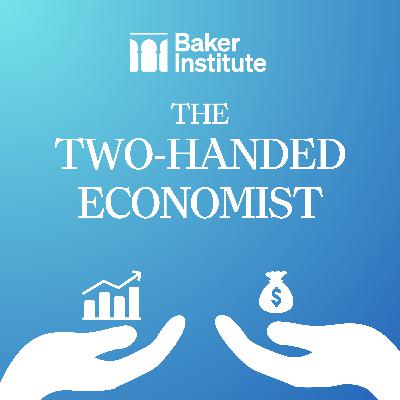Discover Baker Briefing
Baker Briefing

Baker Briefing
Author: Rice University’s Baker Institute for Public Policy
Subscribed: 5Played: 60Subscribe
Share
© 2025 Rice University’s Baker Institute for Public Policy
Description
Hosted by former U.S. Ambassador David Satterfield, “Baker Briefing” makes news make sense by bringing together experts from Rice University's Baker Institute for Public Policy and beyond to break down the most important foreign and domestic policy issues of the day. New episodes weekly.
106 Episodes
Reverse
The Baker Institute’s Kirstin Matthews and Rekha Lakshmanan join the podcast to discuss recent policy developments under Health Secretary Robert F. Kennedy Jr. and his Make America Healthy Again commission, plus the persistent — and dangerous — misinformation linking autism with vaccines.
This conversation was recorded on Sept. 15, 2025.
Featured guests:
Kirstin Matthews, Ph.D., https://www.bakerinstitute.org/expert/kirstin-rw-matthews
Rekha Lakshmanan, https://www.bakerinstitute.org/expert/rekha-lakshmanan
You can follow @BakerInstitute on X, Instagram, LinkedIn, and YouTube. Learn more about our data-driven, nonpartisan policy research and analysis at bakerinstitute.org.
Fellow for the Middle East Mohammad Ayatollahi Tabaar joins the podcast to discuss the geopolitical and diplomatic fallout from the 12-day Israel-Iran war. He explores Iran’s internal politics in the aftermath of the conflict, the future of its nuclear program, and the regional balance of power.
Featured:
Mohammad Tabaar, Ph.D., https://www.bakerinstitute.org/expert/mohammad-ayatollahi-tabaar
Mentioned in this episode:
Mohammad Ayatollahi Tabaar, “The Islamic Republic’s New Lease on Life,” Foreign Affairs, July 8, 2025.
This conversation was recorded on Sept. 5, 2025.
You can follow @BakerInstitute on X, Instagram, LinkedIn, and YouTube. Learn more about our data-driven, nonpartisan policy research and analysis at bakerinstitute.org.
Baker Institute Director David M. Satterfield sits down with Karina Zemel, lead producer of the “Baker Briefing” podcast, to discuss the challenges of communicating policy in a politically polarized era and the conversations ahead on Season 2 of the podcast.
The One Big Beautiful Bill Act, the major budget bill signed into law by President Donald Trump last month, includes important changes to federal energy policy — among them, an earlier end to wind and solar tax credits than outlined in the 2022 Inflation Reduction Act and expanded support for nuclear and geothermal energy, as well as fossil fuels.
Center for Energy Studies Senior Director Ken Medlock joined the podcast to discuss the bill’s implications for the clean energy landscape and the key role of energy markets in dictating the future success of decarbonization and broader efforts to tackle climate change.
Featured:
Ken Medlock, Ph.D., https://www.bakerinstitute.org/expert/kenneth-b-medlock-iii
This conversation was recorded on Aug. 6, 2025.
You can follow @BakerInstitute on X, Instagram, LinkedIn, and YouTube. Learn more about our data-driven, nonpartisan policy research and analysis at bakerinstitute.org.
Texas Republicans are moving to redraw the state’s congressional district map and flip five House seats for the GOP — an unusual mid-decade redistricting effort that comes at the urging of President Donald Trump ahead of the 2026 midterm elections. To block the map’s passage, Texas Democrats have fled the state, denying Republican state leaders the quorum needed to hold a vote.
Political science fellow Mark P. Jones joined “Baker Briefing” to break down the political standoff and what’s at stake for electoral politics in Texas and nationwide.
Featured:
Mark P. Jones, Ph.D., https://www.bakerinstitute.org/expert/mark-p-jones
This conversation was recorded on Aug. 5, 2025.
A transcript of this episode is available here: http://bit.ly/47jPYD6
You can follow @BakerInstitute on X, Instagram, LinkedIn, and YouTube. Learn more about our data-driven, nonpartisan policy research and analysis at bakerinstitute.org.
One of the striking trends in American religion and politics over the past decade has been the extent to which Christians have rallied around President Donald Trump. Their support has been most pronounced among white evangelicals, but the president has gained electoral ground with nearly all Christian denominations since his first term.
Trump hasn’t just appealed to Christian voters through rhetoric. He’s also courted them through policy. Recent examples include a new task force to “eradicate anti-Christian bias” in the federal government and a provision in the One Big Beautiful Bill Act, the vast budget package signed into law earlier this month, that strips Medicaid funding from Planned Parenthood, the nation’s largest abortion provider. (The Hyde Amendment already prohibits federal funds from being used to cover abortions in nearly all cases.)
Seven months into Trump’s second term, how do his policies measure up for his Christian base? Michael Emerson, director of the Baker Institute Religion and Public Program, joined the podcast to help unpack how Christian support affects Trump’s policy agenda — and vice versa.
Mentioned in this episode:
The Godless Crusade: Religion, Populism, and Right-Wing Identity Politics in the West by Tobias Cremer
“My beautiful ‘practicing’ Christians: As churchgoers’ numbers shrink, their social views grow more similar” by Michael Emerson
This conversation was recorded on July 24, 2025.
Access a transcript of this episode.
You can follow @BakerInstitute on X, Instagram, LinkedIn, and YouTube. Learn more about our data-driven, nonpartisan policy research and analysis at bakerinstitute.org.
As Harris County judge, Ed Emmett led the emergency response to weather disasters in the Houston region for nearly 12 years. Bill King is the former mayor of Kemah, Texas, and served on two Texas commissions studying the aftermath of deadly Hurricanes Rita and Ike.
They draw on their experience in disaster mitigation and response and offer reflections on the devastating Texas Hill Country floods, the second deadliest flood event in state history, as a special legislative session begins in Austin and lawmakers put forth proposals for strengthening weather communications and warning systems.
Featured guests:
Ed Emmett, https://www.bakerinstitute.org/expert/edward-m-emmett
Bill King, https://www.bakerinstitute.org/expert/bill-king
This conversation was recorded on July 17, 2025.
A transcript of this episode is available here: https://bit.ly/4o2pNqx
You can follow @BakerInstitute on X, Instagram, LinkedIn, and YouTube. Learn more about our data-driven, nonpartisan policy research and analysis at bakerinstitute.org.
What is Christian nationalism, and why is it having a moment in U.S. politics? And what does it mean for democracy in our increasingly diverse and pluralistic society?
The ideology’s influence hasn’t faded with the dawn of the second Donald Trump administration, and it’s worth returning to this episode, originally released in October 2024, in which our Religion and Public Policy Program experts Michael Emerson and David Brockman explain what Christian nationalism is (and isn’t), what its proponents want to accomplish, and what makes the current iteration of the movement different from what we’ve previously seen in U.S. history.
The conversation is a primer for understanding related developments in U.S. and state-level politics today (which we'll explore in future episodes), including recent policy actions by the Trump administration and new public education measures in Texas.
Among these: the state’s adoption of a controversial “Bible-infused” reading and language arts curriculum for K-5 students, which Brockman reviews in a new report out today from the Baker Institute.
Featured guests:
David Brockman, Ph.D., https://www.bakerinstitute.org/expert/david-r-brockman
Michael Emerson, Ph.D., https://www.bakerinstitute.org/expert/michael-o-emerson
Mentioned:
David Brockman, “Texas’ ‘Bible-Infused’ Public School Curriculum Raises Church–State Questions”
David French, “What Is Christian Nationalism, Exactly?”
A transcript of this episode is available here: https://bit.ly/46GyWig
You can follow @BakerInstitute on X, Instagram, LinkedIn, and YouTube. Learn more about our data-driven, nonpartisan policy research and analysis at bakerinstitute.org.
John Diamond, director of our Center for Tax and Budget Policy and host of “The Two-Handed Economist,” analyzed the macroeconomic impacts of the One Big Beautiful Bill Act — the sprawling tax-and-spending package now signed into law by President Donald Trump — using the Diamond-Zodrow model of the U.S. economy. The results?
The package could modestly boost GDP — but the long-term benefits are limited. It will drastically increase the debt-to-GDP ratio, leading to a crowd-out of private capital and a decline in investment over time. Hear Diamond lay out the good, the bad, and the ugly in the legislation on the podcast with Baker Institute director David Satterfield.
Featured: John Diamond, Ph.D., https://www.bakerinstitute.org/expert/john-w-diamond
Mentioned in this episode:
John Diamond, “Macroeconomic Effects of the One Big Beautiful Bill Act”
Wall Street Journal Editorial Board, “The Meh Tax Bill That Has To Pass”
James Baker III and John Diamond, “DOGE Won’t Be Enough to Get the Federal Debt Under Control”
This conversation was recorded on July 2, 2025. A transcript of this episode is available here: https://bit.ly/46s24cY
You can follow @BakerInstitute on X, Instagram, LinkedIn, and YouTube. Learn more about our data-driven, nonpartisan policy research and analysis at bakerinstitute.org.
The Middle East has undergone major shifts over the past 18 months, not least the Israel-Iran war that lasted for 12 days earlier this month and saw Israeli and U.S. attacks on Iranian nuclear facilities. A conversation with former diplomats Daniel Kurtzer and Aaron David Miller this past May illustrates the political dynamics shaping the future of power in the region, Israel’s war in Gaza, and the evolving U.S.-Israel relationship.
This conversation was recorded at a Baker Institute event on May 15, 2025.
Featured guests:
Former Ambassador Daniel Kurtzer, S. Daniel Abraham Professor of Middle East Policy Studies, Princeton School of Public and International Affairs, https://spia.princeton.edu/faculty/dkurtzer
Aaron David Miller, Senior Fellow, Carnegie Endowment for International Peace, https://carnegieendowment.org/people/aaron-david-miller?lang=en
Learn about future events and live recordings of the “Baker Briefing” podcast by subscribing to our “Events Digest” newsletter: https://www.bakerinstitute.org/newsletter
A transcript of this episode is available here: http://bit.ly/3I59qZR
You can follow @BakerInstitute on X, Instagram, LinkedIn, and YouTube. Learn more about our data-driven, nonpartisan policy research and analysis at bakerinstitute.org.
The U.S. is currently hosting the FIFA Men’s Club World Cup, an international competition between soccer club teams and the prelude to the larger and more widely anticipated FIFA Men’s World Cup hosted next summer across 16 North American cities. (The latter tournament is played between countries, instead of clubs.)
Fellow Kristian Coates Ulrichsen explains why these competitions and other global sports tournaments aren’t just entertainment, but a space where politics, economics, and diplomacy increasingly intersect, with a look in particular at the case of Saudi Arabia and its Crown Prince Mohammad bin Salman.
Coates Ulrichsen is the author of the forthcoming book “Kingdom of Football: Saudi Arabia and the Remaking of World Soccer,” which will be published by Hurst on Aug. 21. The book goes beyond the popular term “sportswashing” to explore how and why Saudi Arabia burst onto the international soccer stage in 2023 and won the rights to host the FIFA Men’s World Cup in 2034.
Featured:
Kristian Coates Ulrichsen, Ph.D., https://www.bakerinstitute.org/expert/kristian-coates-ulrichsen
X: https://x.com/Dr_Ulrichsen
LinkedIn: https://www.linkedin.com/in/kristianulrichsen/
Bluesky: https://bsky.app/profile/kristianulrichsen.bsky.social
Mentioned in this episode:
Kristian Coates Ulrichsen, Kingdom of Football: Saudi Arabia and the Remaking of World Soccer (Hurst, 2025), https://www.hurstpublishers.com/book/kingdom-of-football/ (forthcoming).
This conversation was recorded on June 3, 2025.
You can follow @BakerInstitute on X, Instagram, LinkedIn, and YouTube. Learn more about our data-driven, nonpartisan policy research and analysis at bakerinstitute.org.
This is the second episode in a two-part conversation on the challenges facing Mexico domestically and in its relationship with the United States.
Tony Payan, director of the Center for the U.S. and Mexico, joins “Baker Briefing” to examine the host of issues facing the U.S.-Mexico relationship under Presidents Donald Trump and Claudia Sheinbaum. His conversation with David Satterfield covers tariffs and the future of the North American trade agreement, Trump’s executive order designating cartels as terrorists — which has led to U.S. visa restrictions for some Mexican politicians — and the brewing water crisis facing Sheinbaum as drought at the border persists.
Featured:
Tony Payan, Ph.D., https://www.bakerinstitute.org/expert/tony-payan
Follow Tony on X: https://x.com/PayanTony
Follow Tony on LinkedIn: https://www.linkedin.com/in/tony-payan-373bb870/
This conversation was recorded on May 14, 2025. A transcript of this episode is available here: https://bit.ly/3ZVKOIX
You can follow @BakerInstitute on X, Instagram, LinkedIn, and YouTube. Learn more about our data-driven, nonpartisan policy research and analysis at bakerinstitute.org.
This is the first episode in a two-part conversation on the challenges facing Mexico domestically and in its relationship with the United States.
Mexico held its first judicial elections on June 1, following last year’s sweeping overhaul of the judiciary. Center for the U.S. and Mexico director Tony Payan joins “Baker Briefing” to discuss the implications of the reforms and other domestic challenges facing President Claudia Sheinbaum as she carries forward the political project of former President Andrés Manuel López Obrador — including Mexico’s complex public safety landscape and mounting public debt.
Featured:
Tony Payan, Ph.D., https://www.bakerinstitute.org/expert/tony-payan
Follow Tony on X: https://x.com/PayanTony
Follow Tony on LinkedIn: https://www.linkedin.com/in/tony-payan-373bb870/
This conversation was recorded on May 14, 2025. A transcript of this episode is available here: https://bit.ly/445QmTK
You can follow @BakerInstitute on X, Instagram, LinkedIn, and YouTube. Learn more about our data-driven, nonpartisan policy research and analysis at bakerinstitute.org.
Drs. Sandra McKay and Eric Fleegler, both experts in the Baker Institute Firearm Injury Prevention and Safety Program, joined “Baker Briefing” to discuss the worsening gun injury epidemic ahead of our fourth annual firearm injury prevention conference on June 6.
They discussed areas of consensus among firearm-owners and non-owners alike, including child access prevention laws and age purchasing regulations, and prospects for commonsense gun legislation at the Texas and national levels.
Featured guests:
Sandra McKay, M.D., FAAP, https://www.bakerinstitute.org/expert/sandra-mckay
Eric Fleegler, M.D., MPH, https://www.bakerinstitute.org/expert/eric-fleegler
Mentioned in this episode:
Christopher F. Kulesza et al., “The State of Student Mental Health in Houston Schools,” Rice University’s Baker Institute for Public Policy, May 13, 2025, https://doi.org/10.25613/6823-6W19.
This conversation was recorded on May 20, 2025.
A transcript of this episode is available here: https://bit.ly/3SnjEXs
You can follow @BakerInstitute on X, Instagram, LinkedIn, and YouTube. Learn more about our data-driven, nonpartisan policy research and analysis at bakerinstitute.org.
In its first months, the second Trump administration has upended the alliances, institutions, and norms that have anchored U.S. foreign policy for decades — hiking tariffs on virtually all countries, downplaying U.S. military commitments, and all but dismantling the U.S. Agency for International Development. Meanwhile, as the U.S. steps back from a world order that’s largely of its own making, China is attempting to fill the void.
Steven Lewis, director of the Baker Institute China Studies Program, joined “Baker Briefing” to discuss what China’s global soft power campaign looks like and how successful it’s proven thus far.
Featured guest:
Steven Lewis, Ph.D., https://www.bakerinstitute.org/expert/steven-w-lewis
This conversation was recorded on May 13, 2025.
A transcript of this episode is available here: https://bit.ly/43djVT8.
You can follow @BakerInstitute on X, Instagram, LinkedIn, and YouTube. Learn more about our data-driven, nonpartisan policy research and analysis at bakerinstitute.org.
Syria’s 13-year civil war came to a stunning end on Dec. 8, 2024, when rebel fighters led by the Islamist group Hayat Tahrir al-Sham succeeded in toppling the brutal dictatorship of Bashar Assad. With the country now deeply fragmented and impoverished, what will the future of governance be under the transitional government of Ahmad al-Sharaa?
Rana B. Khoury, an assistant professor of political science at the University of Illinois Urbana-Champaign, and Ibrahim Al-Assil, a senior fellow at the Middle East Institute, joined “Baker Briefing” to discuss the regional reaction to Dec. 8, the structural challenges facing the rebuilding process, and prospects for the return of refugees and internally displaced Syrians.
Featured guests:
Ibrahim Al-Assil, DIA, Senior Fellow, Middle East Institute, https://www.mei.edu/profile/ibrahim-al-assil
Rana B. Khoury, Ph.D., Assistant Professor of Political Science, University of Illinois Urbana-Champaign, https://ranakhoury.com/
This conversation was recorded on April 29, 2025. A transcript of this episode is available here.
You can follow @BakerInstitute on X, Instagram, LinkedIn, and YouTube. Learn more about our data-driven, nonpartisan policy research and analysis at bakerinstitute.org.
Federal hospital price transparency rules went into effect in 2021. Four years later, hospitals across the country — including the four largest hospitals in the Texas Medical Center, as assessed in a new Baker Institute brief — still aren’t complying. On this episode of “Baker Briefing,” Vivian Ho explains why opacity in pricing is a key driver of rising health care costs and what policymakers can do to tackle the problem.
Mentioned in this episode:
Derek Jenkins, Sasathorn Tapaneeyakul, and Vivian Ho, “Prices Versus Costs: Unpacking Rising US Hospital Profits,” Rice University’s Baker Institute for Public Policy, September 6, 2024.
Lunna Lopes et al., “Americans’ Challenges With Health Care Costs,” KFF, March 1, 2024, https://www.kff.org/health-costs/issue-brief/americans-challenges-with-health-care-costs/.
Shameek Rakshit et al., “The Burden of Medical Debt in the United States,” Peterson-KFF Health System Tracker, February 12, 2024, https://www.healthsystemtracker.org/brief/the-burden-of-medical-debt-in-the-united-states/.
Sebastian Spataro Solorzano, Blake Davidson, and Vivian Ho, “Revisiting Price Transparency at Texas Medical Center Hospitals,” Rice University’s Baker Institute for Public Policy, April 29, 2025.
You can follow @BakerInstitute on X, Instagram, LinkedIn, and YouTube. Learn more about our data-driven, nonpartisan policy research and analysis at bakerinstitute.org.
Additional sources for this episode:
American Hospital Association, Trend Watch Chartbook 2018: Trends Affecting Hospitals and Health Systems (2018), https://www.aha.org/system/files/media/file/2022/11/2018-TrendWatch-Chartbook-Full.pdf.
Zach Cooper et al., “The Price Ain’t Right? Hospital Prices and Health Spending on the Privately Insured,” The Quarterly Journal of Economics 134, no. 1 (February 2019): 51–107, https://doi.org/10.1093/qje/qjy020.
Health Affairs, “The Role Of Administrative Waste In Excess US Health Spending,” October 6, 2022, https://www.healthaffairs.org/content/briefs/role-administrative-waste-excess-us-health-spending.
Salpy Kanimian and Vivian Ho, “Why Does the Cost of Employer-Sponsored Coverage Keep Rising?,” Health Affairs Scholar 2, no. 6 (June 2024), qxae078, https://doi.org/10.1093/haschl/qxae078.
Lunna Lopes et al., “Health Care Debt in the U.S.: The Broad Consequences of Medical and Dental Bills,” KFF, June 16, 2022, https://www.kff.org/report-section/kff-health-care-debt-survey-main-findings/.
Anne Martin et al., “National Health Expenditures in 2023: Faster Growth as Insurance Coverage and Utilization Increased,” Health Affairs 44, no. 1 (2025): 12–22, https://doi.org/10.1377/hlthaff.2024.01375.
Anu Singh, “Hospital and Health System M&A in Review: Financial Pressures Emerge as Key Driver in 2023,” Kaufman Hall, January 18, 2024, https://www.kaufmanhall.com/insights/research-report/2023-hospital-and-health-system-ma-review.
Laura Tollen, Elizabeth Keating, Alan Weil, “How Administrative Spending Contributes to Excess US Health Spending,” Health Affairs, February 20, 2020, https://www.healthaffairs.org/content/forefront/administrative-spending-contributes-excess-us-health-spending.
We’re in a new era of discovery in the history of artificial intelligence, but rapid advances in the technology are also bringing major risks. Moshe Vardi, a leading expert in computational engineering and Baker Institute fellow, joins the podcast to discuss the ethical and strategic choices on AI facing the U.S. amid its competition with China and the unintended consequences of outsourcing our thinking to machines.
Mentioned in this episode:
Moshe Vardi, “Big Tech, You Need Academia. Speak Up!,” Communications of the ACM 68, no. 5 (2025): 5, https://dl.acm.org/doi/10.1145/3727870.
This conversation was recorded in front of a live studio audience on April 17, 2025. Learn about future live recordings of the “Baker Briefing” podcast by subscribing to our “Events Digest” newsletter at https://www.bakerinstitute.org/newsletter.
You can follow @BakerInstitute on X, Instagram, LinkedIn, and YouTube. Learn more about our data-driven, nonpartisan policy research and analysis at bakerinstitute.org.
With its aggressive mass deportation campaign, the Trump administration is attempting to reshape long-standing U.S. immigration policy — and increasingly defying constitutional guardrails in the process.
On this episode, experts examine the legal and social implications of the administration’s unconventional targeting of legal permanent and temporary residents, asylum seekers, and even foreign students, and well as the administration’s overt challenges to judicial authority and due process rights.
Host David Satterfield was joined by Tony Payan, director of the Baker Institute Center for the U.S. and Mexico; Luz Maria Garcini, assistant professor of psychological sciences at Rice University and director of the Center for Community and Public Health at Rice’s Kinder Institute for Urban Research; and David Donatti, a senior staff attorney at the ACLU of Texas and lecturer at Rice.
This conversation was recorded on April 21, 2025, in front of a live studio audience. Learn about future live recordings of the “Baker Briefing” podcast by subscribing to our “Events Digest” newsletter at https://www.bakerinstitute.org/newsletter.
You can follow @BakerInstitute on X, Instagram, LinkedIn, and YouTube, and learn more about our data-driven, nonpartisan policy research and analysis at bakerinstitute.org.
Introducing “The Two-Handed Economist” — a new podcast with timely analysis of economic policy developments from John Diamond, director of the Center for Tax and Budget Policy.
Why a two-handed economist? President Harry Truman famously asked for a one-handed economist, tired of hearing, “On the one hand, this,” and “On the other hand, that.” On “The Two-Handed Economist,” we embrace the complexity that a one-handed economist might shy away from.
Our first episode dives deep into the economic fallout from the Trump administration’s sweeping new tariffs, unpacking the market turmoil, impacts for consumers, and global response. A transcript is available here.
Subscribe now on your favorite podcast platform.
Mentioned:
“Innovation and Trade Policy in a Globalized World” by Ufuk Akcigit (University of Chicago, NBER, CEPR), Sina T. Ates (Federal Reserve Board), and Giammario Impullitti (University of Nottingham), 2021.
This episode was recorded on April 15, 2025.
You can follow @BakerInstitute on X, Instagram, LinkedIn, and YouTube, and learn more about our data-driven, nonpartisan policy research and analysis at bakerinstitute.org.




